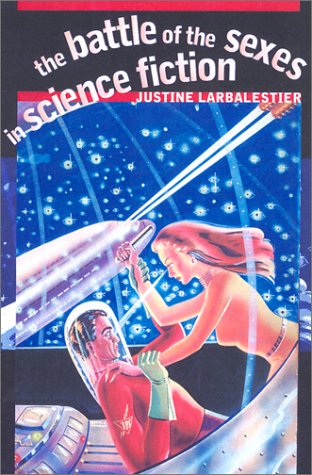
Going to the library is often a journey of discovery. I think that's one reason why libraries are way more fun than, say, Amazon.com, or even a well stocked bookstore. A few days ago I found myself cruising the stacks at our newly remodeled Mariott Library (now earth quake resistant!), looking for the intriguingly titled "The Battle of the Sexes in Science Fiction" by Justine Larbalestier. I found the book, about which more later, but next to it (this was the section of literary criticism concerning itself with science fiction and fantasy) was another entitled, "The Gospel according to Science Fiction" by Gabriel McCee. The cover depicts a hovering flying saucer, glories of light streaming down from it onto an old barn by a lake shore where a few boats appear to be docked: the kind of picture that simultaneously evokes space aliens and American Old Time Religion.
Now, science fiction is to my mind a quintessentially humanistic literature. Where anything that smacks of the supernatural is concerned, it is either debunked or subordinated to the order of natural phenomena. What could McKee be talking about?
Well, McKee suggests that science fiction isn't nearly as rational as all that. He starts by couching his discussion in terms that would equivocate the opposing forces of reason and superstition, but in fact what he ends up demonstrating is that the world views that parents and pulpits inculcate us with are not so easily discarded.
By covering a variety of topics, from the nature of destiny to the nature of deity, McKee lists a wide range of stories where authors, rather than reveling in the freedom of humanistic ideas, bow to the strictures of fairly standard (though mostly Western) religious beliefs. There is very little cheating going on. Stories like "The Day the Earth Stood Still" which was filmed intentionally to depict religious iconography, or "Out of the Silend Planet," which was intended to be a
modern retelling of the origin of sin, clearly will fit the topic, but McKee finds that most stories, from time travel series like Quantum Leap to space opera like Star Trek contain and express the beliefs of their (presumably) Christian creators.
The book is a fascinating survey of the field from a perspective that I never would have guessed revealing. Strongly recommended to anyone interested in science fiction as literature.

The other book, "The Battle of the Sexes," was going to treat a much more obvious topic. Most people who have read science fiction from the early days, when the likes of EE "Doc" Smith were writing stories of Skylarks and Lensmen, are aware that women were a rarely mentioned fraction of the human race. Perhaps we attach no great significance to this, since there weren't a lot of women in pirat stories or detective stories, either. Larbalestier, however, is determined to draw the veil from our eyes.
Science fiction started out by having a kind of sacred purpose, that of
being stories that had a scientific basis. Hence Gernsback's original term for these stories was "scientific fiction" or "scienti-fiction." If it was going to be science fiction, then the emphasis was on the first word, not the second. And women (as well as anything to do with women) had no place in that.
It is actually somewhat cringe inducing to read about these early stories, or the letters that male fans wrote in defense of banishing women from the stories. I was wondering if this deplorable past was the reason for science fiction's ill repute, but then Larbalestier also talks about the other side, for when there is a battle, there have to be two sides. It was admittedly fairly one-sided for a long while, but by the seventies women had discovered the genre as a perfect foil for
telling their side of the story. Larbalestier devotes the final two chapters of the book to Alice Sheldon/James Tiptree Jr and the award named after her.
It really doesn't matter if you like science fiction or not (though the
book provides an excellent cross section of both the literature and the fans), or if you're a feminist or not, but this book is, in my opinion worth reading regardless of your point of view. While Larbalestier is Australian, and only spent a relatively short time in America, her account of the battle of the sexes in science fiction is an excellent spotlight on one of the more contentious social issues in a country that prided itself on treating all men equally, but saw fit to give women the vote less than one hundred years ago.
Again, this book is strongly recommended.
